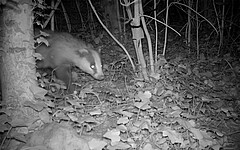Hohenheim is "Europe's most species-rich campus" [03.07.23]
It is done! KomBioTa researchers, students and Citizen Scientists jointly identified 2087 wild animal and plant species on the Hohenheim campus within the past 6 weeks. Thus, the original goal of 1000 species was more than doubled and the title "Europe's most species-rich campus" was brought to the University of Hohenheim.

With 2087 species recorded, the species experts from the KomBioTa network, together with students and Citizen Scientists, brought the title of "Europe's most species-rich campus" to the University of Hohenheim. (Photo: Astrid Untermann)
On Friday, June 30, at 3 pm, the ICA Biodiversity Challenge 2023 ended officially with an online event organized by Wageningen University. During this ceremony, the ranking among the 17 participating universities from 13 European countries were announced. The University of Hohenheim emerged as the first-place winner of the challenge, and can now officially call itself "Europe's most biodiverse campus”.

The biodiversity of the Hohenheim campus also includes shy badgers. However, mainly vascular plants were recorded, followed by beetles and moths. (Photo: University of Hohenheim/Department of Zoology)
The competition remained exciting right to the end. Among the 2087 species recorded in Hohenheim were rare spider species, wild orchids as well as shy badgers. The exact observations can be viewed in detail with location and in some cases photos at https://observation.org/bioblitz/university-of-hohenheim. With 1873 recorded species, the Swedish University of Agricultural Sciences (SLU) came in second, while KU Leuven from the Netherlands landed in third place with 1453 species.
KomBioTa would like to express its sincere thanks for the enormous commitment of all attending taxonomists! Without that, such an impressive result would not have been possible. It is great to see so much passion and love for species knowledge in our network!
Back to Latest News